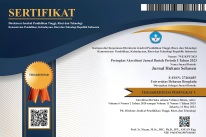Juridical Review of Law Enforcement against the Crime of Money Laundering According to Article 3 of Law Number 8 of 2010 concerning Prevention and Eradication of the Crime of Money Laundering (Case Study of Money Laundering at the Bengkulu District Court)
Abstract
Crime is human behavior and actions that are carried out on other people or parties or institutions that in principle benefit those who commit crimes. Indonesia is one of the countries that is quite open to being the target of money laundering, in the crime of money laundering there is a special institution that functions as an intermediary to provide suspicious transaction data to investigators, namely the Financial Transaction Reports and Analysis Center (PPATK). This legal research uses empirical research methods. In this concept of anti-money laundering, the perpetrators and the proceeds of criminal acts can be identified through a search so that the proceeds of the crime are confiscated for the state or returned to those who are entitled. If the assets resulting from criminal acts that are controlled by the perpetrators or criminal organizations can be confiscated or confiscated, it can automatically reduce the crime rate. For this reason, efforts to prevent and eradicate the crime of Money Laundering require a strong legal basis to ensure legal certainty, the effectiveness of law enforcement and the search and return of assets resulting from criminal acts. The inhibiting factors for law enforcement in cases of money laundering in Indonesia are the lack of a common understanding of law enforcement officers regarding the crime of money laundering, the rapid progress of science and technology making it more difficult to detect money laundering and the non-compliance of financial service providers in supporting the anti-money laundering regime.
Downloads
Copyright (c) 2020 Ana Tasia Pase, Ferawati Royani, Feby Ilham Fitra

This work is licensed under a Creative Commons Attribution-ShareAlike 4.0 International License.






